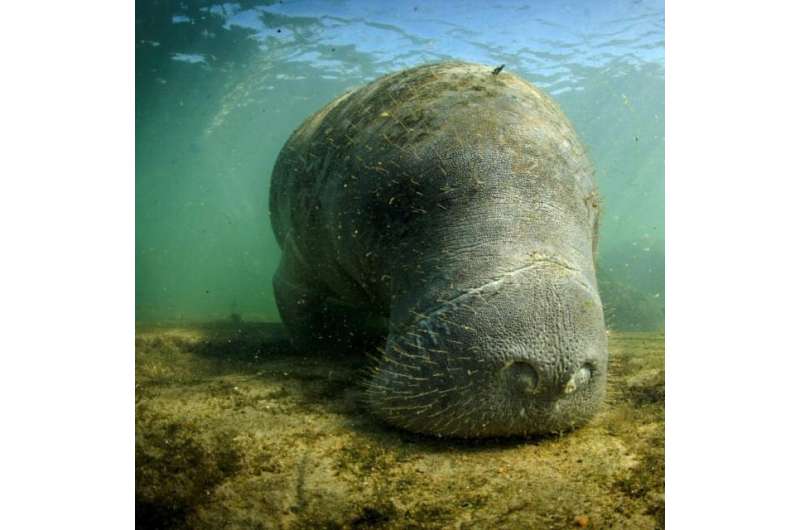Manatees resort to eating more algae when seagrass disappears

Manatees resorted to eating a staggering amount of algae after seagrasses died-off in Florida's Indian River Lagoon.
Florida International University (FIU) Institute of Environment Ph.D. student Aarin-Conrad Allen and a collaborative team of researchers have found the first evidence that Florida manatees went from primarily eating seagrasses to primarily eating algae after a 2011 harmful algal bloom decimated local seagrasses. Researchers made the discovery by comparing the stomach contents of manatees living in the Indian River Lagoon during the late 1970s and throughout the 1980s to manatees living there between 2013 and 2015.
The Indian River Lagoon is a critically important habitat for manatees, especially during the winter. Where there was once a bounty of seagrass, there are ever-increasing and more common algal blooms. When half the seagrass died in 2011, there were cascading impacts. Many manatees starved. Some died. Last year, Florida lost a record 1,100 manatees—and, in the first two months of 2022, more than 100 have died.
"Manatees primarily eat seagrass but do sometimes supplement their diet with algae and other things like freshwater grasses," said Allen, who works in FIU Marine Sciences Assistant Professor Jeremy Kiszka's lab. "The dramatic shift to algae being the primary focal diet item is interesting, because we're not sure what the health implications will be to the manatees."
Allen examined 103 stomach samples collected by the Florida Fish and Wildlife Conservation from manatees that had died for unknown reasons between 2013 and 2015. Their diet contained almost 50 percent algae and 34 precent seagrass. He compared this to archival samples from 1977 – 1989, when the lagoon was healthier. The manatees' diets were only 28 percent algae and as much as 62 percent seagrass. The manatees' remaining diets were made up of other aquatic plants, invertebrates and other food sources.
"The results of our study show what most had already suspected – manatees in the Indian River Lagoon are consuming less seagrass," said United States Geological Survey's Cathy Beck, who pioneered the modified microscope point techniques that were used to examine the stomach samples. "This is not likely due to a change in preference but a change in seagrass availability as a food source. Macroalgae is helping to satiate their hunger, but the long-term implications on manatee health of this monumental shift in diet has yet to be investigated."
As Allen points out, this research presents more questions that need to be answered. Currently, he's investigating how much seagrass is left in the Indian River Lagoon. He is also measuring and comparing the nutritional value of algae versus seagrass, particularly to understand if algae is synonymous of "junk food" for these large herbivores.
With algal blooms becoming more prevalent in an era of climate change, one thing is clear—manatees will have to respond somehow, by either leaving the Indian River Lagoon to find food elsewhere or perhaps stay and continue to feed on algae even if it doesn't meet their nutritional needs.
Allen says the findings also have implications for other similar ecosystems. What happened in Indian River Lagoon could happen in Biscayne Bay—another important habitat for Florida's manatees.
"In the eye of what we've seen here, it is definitely something we can see elsewhere," Allen said. "This can happen in other systems around the world. The problem needs to be addressed on a larger scale."
The findings were recently published in Estuarine, Coastal and Shelf Science.
More information: Aarin Conrad Allen et al, Evidence of a dietary shift by the Florida manatee (Trichechus manatus latirostris) in the Indian River Lagoon inferred from stomach content analyses, Estuarine, Coastal and Shelf Science (2022). DOI: 10.1016/j.ecss.2022.107788
Provided by Florida International University















